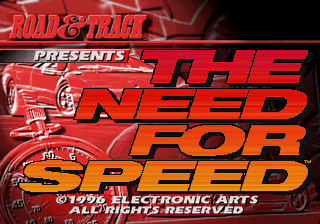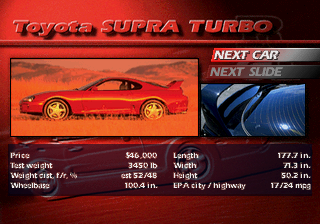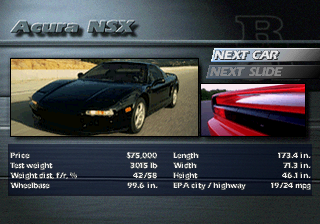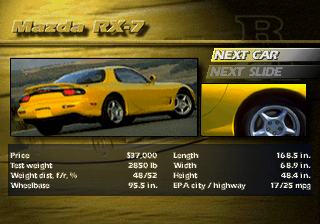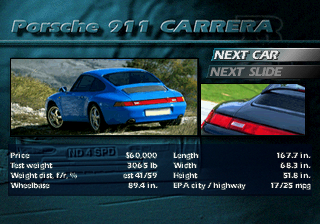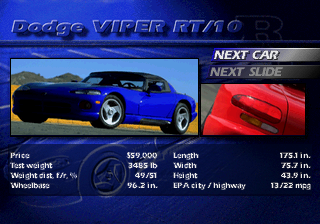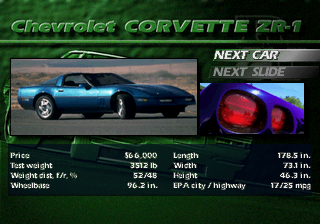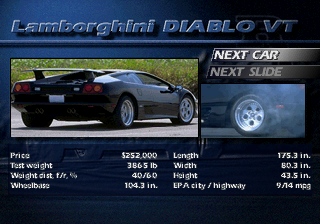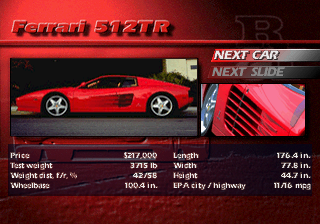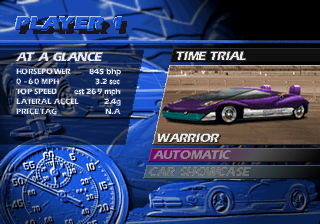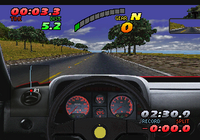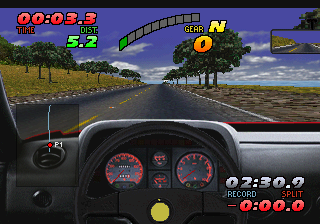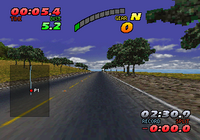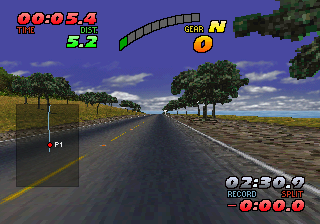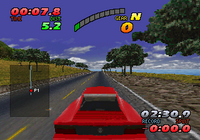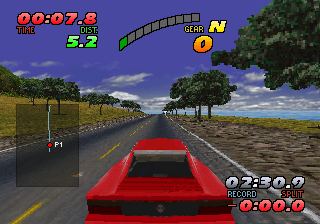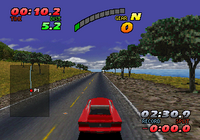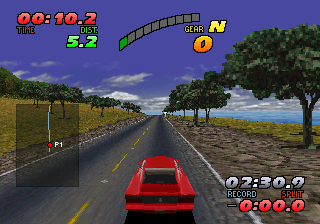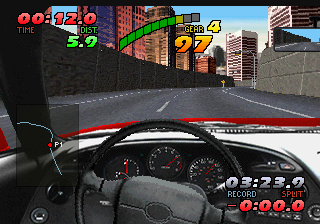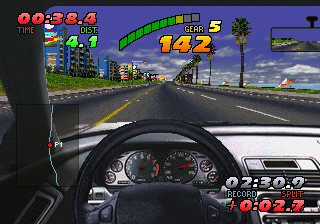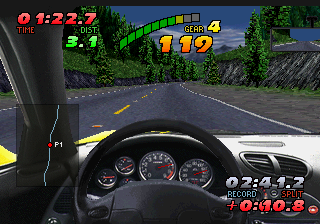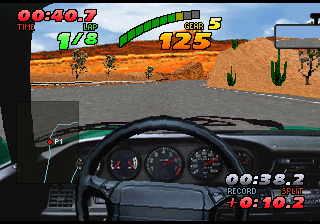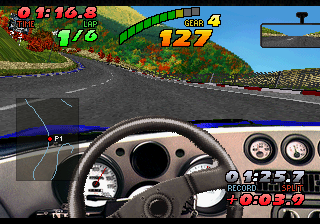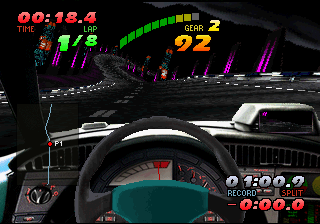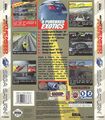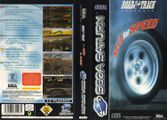Road & Track Presents The Need for Speed
From Sega Retro
| Road & Track Presents The Need for Speed | |||||||||||||||||||||||||||||||||||||||||||||
|---|---|---|---|---|---|---|---|---|---|---|---|---|---|---|---|---|---|---|---|---|---|---|---|---|---|---|---|---|---|---|---|---|---|---|---|---|---|---|---|---|---|---|---|---|---|
| System(s): Sega Saturn | |||||||||||||||||||||||||||||||||||||||||||||
| Publisher: Electronic Arts | |||||||||||||||||||||||||||||||||||||||||||||
| Developer: Pioneer Productions, Electronic Arts Canada | |||||||||||||||||||||||||||||||||||||||||||||
| Distributor: Tec Toy (BR), Electronic Arts Africa (ZA), Aral (TR) | |||||||||||||||||||||||||||||||||||||||||||||
| Licensor: Acura, Chevrolet, Dodge, Ferrari, General Motors, Lamborghini, Mazda, Porsche, Toyota | |||||||||||||||||||||||||||||||||||||||||||||
| Peripherals supported: Arcade Racer, Saturn Backup Memory, Mission Stick | |||||||||||||||||||||||||||||||||||||||||||||
| Genre: Racing | |||||||||||||||||||||||||||||||||||||||||||||
| Number of players: 1-2 | |||||||||||||||||||||||||||||||||||||||||||||
| |||||||||||||||||||||||||||||||||||||||||||||
|
Road & Track Presents The Need for Speed, is a racing game developed by Pioneer Productions and published by Electronic Arts for a number of consoles including the Sega Saturn.
In Japan, this game was significantly altered and released as Nissan Presents Over Drivin' GT-R.
Contents
Gameplay
The game is a racing game featuring many of the most desirable sports cars of its time. There are multiple selectable courses, which include open road courses where players race from point-to-point and circuits where players must complete a certain number of laps.
Using a standard control pad, the car is steered with ![]() and
and ![]() . It accelerates with
. It accelerates with ![]() and brakes with
and brakes with ![]() . The player can pull the handbrake with
. The player can pull the handbrake with ![]() , which can be used to take tight corners. The transmission is downshifted with
, which can be used to take tight corners. The transmission is downshifted with ![]() and upshifted with
and upshifted with ![]() . The car starts in neutral but can be "downshifted" into reverse or upshifted into first gear. All of the cars in the game are equipped with manual transmissions, but game has an automatic mode where the computer automatically selects a gear. In this mode, the player must still shift into the forward gear from neutral at the start of the race or after recovering from a crash.
. The car starts in neutral but can be "downshifted" into reverse or upshifted into first gear. All of the cars in the game are equipped with manual transmissions, but game has an automatic mode where the computer automatically selects a gear. In this mode, the player must still shift into the forward gear from neutral at the start of the race or after recovering from a crash.
The game is compatible with the Arcade Racer and the Mission Stick for analogue control. With the Arcade Racer, ![]() accelerates,
accelerates, ![]() brakes, and
brakes, and ![]() pulls the handbrake. The paddles are used for shifting. With the Mission Stick, the car accelerates by moving the stick forward and brakes by moving the stick back. It upshifts with
pulls the handbrake. The paddles are used for shifting. With the Mission Stick, the car accelerates by moving the stick forward and brakes by moving the stick back. It upshifts with ![]() and downshifts with
and downshifts with ![]() . The handbrake is used with
. The handbrake is used with ![]() .
.
With all controllers, the player can change the view with ![]() or toggle the HUD with
or toggle the HUD with ![]() . The car also has a horn that can be honked with
. The car also has a horn that can be honked with ![]() .
.
Cars cannot take damage from crashes and bounce off objects rather than colliding with them.
A replay feature allows the player to view highlights after the race from multiple camera angles.
Modes
The game can be played in multiple modes:
- Time Trial: The player chooses a car and a course and races against the clock.
- Head to Head: The player faces a single opponent. If played against the computer, the player chooses the opponent's car.
- Single Race: A race against seven opponents. The player can choose the car that the computer-controlled racers drive.
- Tournament: A tournament where the player tries to place first on every track. The tracks can be played in any order. Each track is limited to a subset of cars with comparable performance. Placing first on all tracks unlocks an additional bonus course.
All of the modes except Time Trial can be played with a second player. The open road courses in the Head to Head mode include traffic that must be avoided by the player and police cars that pursue and try to ticket the player. Players are arrested after receiving two tickets.
Cars
Owing to the collaboration with Road & Track magazine, each car in the game (with the exception of the fictional hidden car, the Warrior) is presented with detailed specifications, history, audio commentaries, multiple pictures, and videos.
| Toyota Supra Turbo | |
|---|---|
| The Toyota Supra Turbo uses a front-mounted DOHC 3.0 L straight-six engine with intercooled twin-turbochargers. This was the last generation of the original Supra, though the nameplate would be revived much later in 2019. | |
| Acura NSX | |
| The Acura NSX, known as the Honda NSX outside of North America, is a mid-engine car with a 3.0 L DOHC 90-degree V6. It was designed specifically to compete with Ferrari and features an all-aluminum body. Its engine can rev up to 8000 rpm, higher than any other piston engine in the game. | |
| Mazda RX-7 | |
| The Mazda RX-7 uses a twin-turbocharged 1.3 L two-rotor Wankel rotary engine mounted in the front of the car. The Wankel is lightweight and high-revving (up to 8000 rpm). | |
| Porsche 911 Carrera | |
| The Porsche 911 Carrera has a naturally aspirated 3.6 L SOHC six-cylinder boxer engine mounted behind the rear axle. This model was the first to use a rear multi-link suspension and the last to use an air-cooled engine. | |
| Dodge Viper RT/10 | |
| The Dodge Viper RT/10 has a front-mounted, naturally aspirated 8.0 L OHV V10 engine, the largest engine displacement for any production car in its class. | |
| Chevrolet Corvette ZR-1 | |
| The Corvette ZR-1 uses a naturally aspirated 5.7 L OHV V8 engine mounted behind the front axle. It is the first generation of the Corvette to use a transverse leaf spring for its front suspension, which acts as both a ride spring and an anti-roll bar. | |
| Lamborghini Diablo VT | |
| The Lamborghini Diablo VT is a mid-engine car with a 5.7 L DOHC V12 engine and all-wheel drive. | |
| Ferrari 512TR | |
| The Ferrari 512TR derives from the popular Ferrari Testarossa model (the star of Sega's arcade classic, OutRun). Only 512 vehicles were ever produced. It is a mid-engine car with an all-aluminum 4.9 L DOHC 12-cylinder engine. Typically for Ferrari, the engine is flat, with the cylinders horizontally opposed 180 degrees, but each piston shares a crankpin with the piston across from it like a V engine rather than each piston having its own crankpin like a boxer engine. | |
| Warrior PTO E/2 | |
| The Warrior is a fictional secret car powered by jet fuel producing 845 bhp. |
Views
The player can cycle through four different perspectives during the race with ![]() .
.
When using one of the first-person views, the camera automatically pivots to a third-person view after crashing or spinning around (such as from an excessive handbrake turn).
The In-Car Cam is not available in two-player split screen races.
Courses
The Saturn and PlayStation versions include an additional three courses over the original 3DO version. All courses (with the exception of the bonus course, Lost Vegas) can be played in the morning, mid-day, or evening.
City, Coastal, and Alpine are open road courses consisting of three segments each.
Rusty Springs, Autumn Valley, Vertigo Ridge, and Lost Vegas are circuits. The player can choose to race 4, 8, or 16 laps on Rusty Springs and Lost Vegas or 2, 6, or 12 laps on Autumn Valley and Vertigo Ridge.
| City | |
|---|---|
| In Tournament mode, the cars available are the Mazda RX-7, Acura NSX, and Toyota Supra Turbo. | |
| Coastal | |
| In Tournament mode, the cars available are the Porsche 911 Carrera, Dodge Viper RT/10, and Chevrolet Corvette ZR-1. | |
| Alpine | |
| In Tournament mode, the cars available are the Lamborghini Diablo VT and the Ferrari 512TR. | |
| Rusty Springs | |
| In Tournament mode, the cars available are the Mazda RX-7, Acura NSX, and Toyota Supra Turbo. | |
| Autumn Valley | |
| In Tournament mode, the cars available are the Porsche 911 Carrera, Dodge Viper RT/10, and Chevrolet Corvette ZR-1. | |
| Vertigo Ridge | |
| In Tournament mode, the cars available are the Lamborghini Diablo VT and the Ferrari 512TR. | |
| Lost Vegas | |
| This is a bonus course unlocked by winning all of the tracks above in Tournament mode. |
History
Development
The Need for Speed was developed in part by Electronic Arts Canada, previously known as Distinctive Software. As a racing game attempting to simulate the feel of driving, it can therefore be seen as a spiritual successor to The Duel: Test Drive II (1990's Test Drive III: The Passion being developed by a different team for Accolade).
Versions
The Saturn version of The Need for Speed derives from the DOS version, which in turn was an enhanced port of the 3DO original. While outputting at a smaller resolution, the Saturn shares many of the new textures introduced in the PC version and retains most of the new gameplay options (and adds a two-player split-screen option too). It also runs much faster than its 3DO counterpart, partly due to the console's improved performance (being able to output a stable 30FPS versus the 3DO's wavering 15FPS), but also due to design changes in the PC game to make The Need for Speed feel faster.
Whereas the horizon rotates slightly when going around corners in the 3DO version of the game, on the Saturn it remains fixed at all times in the segment tracks during race. However, it does rotate in the circuit tracks during race, and in all tracks during highlights and replays.
The first version of the Saturn game has a bug that can prevent the drawing of the gauges in the cockpit view and the track on the radar. That bug only manifests itself if the game is started with some adapter cartridges (such as the Action Replay, although not all versions will trigger the bug, or the All-in-one Pseudo Saturn Kai). There is a later revision of the game released at least in Japan that corrects this bug.
The Saturn version also allows users to select the time of day which is not seen in older versions.
While the PC version is generally considered to be the definitive version of the game, only high-end machines could utilise the game's top graphical settings in 1995. The PC version is also restricted to 8-bit colour, as opposed to the 16-bit or 32-bit colour depths found in the console ports.
The PlayStation adaptation improves on what is found on the Saturn, re-introducing some of the minor details lost in the Saturn conversion while adding new lighting effects. However its uncapped framerate means the game appears more "juddery" than its Saturn counterpart, as frame rates average between 30-35 FPS. Console additions would be re-introduced to the PC in the form of Road & Track Presents The Need For Speed SE in 1996.
Production credits
- Lead Programmer: Greg D'Esposito
- Programmers: James Hague, Gordon Ludlow
- Additional Programming: Shelby Hubick
- Lead Artist: Andy Fuller
- Artists: Sasha Runnels, Mike Cressy, Victor von Beck
- Audio Engineer: Robert Ridihalgh
- Testing: Gayle Johnson
- Development Director: Bronwyn Richardson
- Art Director: Scott Jackson
- Technical Director: Brad Gour
- Audio Director: Alistair Hirst
- Development Director: Brett Bradstock
- Game Design: Hanno Lemke, Scott Blackwood
- Producer: Hanno Lemke
- Associate Producer: Gregg Giles
- Assistant Producer: Scott Blackwood
- Production Assistant: Serena McCabe
- Product Manager: Peter Royea
- Package and Design: Dave Parmley
- Documentation: Jason Armatta
- Documentation Design & Layout: Corinne Mah
- Quality Assurance: Ollie Ongpin, Bryan Davis
- Art Direction: Nancy Waisanen
- Associate Producer: Marcus Lindblom
- English Voice Over: Michael Donovan
- German Voice Over: Egon Hoegen, Rolf-Dieter Busch, Martin Siebel
- Japanese Voice Over: Tor Furuya
- Japanese Staff: Takashi Mori, Takashi Yamaguchi, Satomi Ishii
- QA Coordinator: Rod Higo
- Lead QA Tester: Martin McQueen
- Backup QA Tester: Tim Lewinson
- Testers: Darren Sleno, Eric Bertram, Trevor Kerslake, Ryan Marshall, Andy Teal, Willie Loh, Randy Deluna
- Lead Programmer: Wei Shoong Teh
- Senior Programmer: Brad Gour
- Programmers: Dave Lucas, Laurent Ancessi, Daniel Teh, Shelby Hubick, Funky Swadling, Michael Pohoreski, David Bullock
- Additional Programming: Jay MacDonald, Victoria Wong, D.M. Abrahams-Gessel
- Lead Artist/3D Modelling: Kent Maclagan
- Artists: Scott Jackson, Peter King, Robert Sculnick, Deja Stanisavljevic, Tom Graham
- Track Modeling: Sheila Allan
- 3D Modeling: Markus Tessmann
- Lead Audio: Alistair Hirst
- Music: Jeff Dyck, Saki Kaskas, Alistair Hirst
- Recording Engineers: Jeff Dyck, Edwin Dolinski
- Video Technician: Richard Mul
- Development Director: Brett Bradstock
- Technical Director: Brad Gour
- Art Design: Scott Jackson
- Producer/Designer: Hanno Lemke
- Asst. Producer/Designer: Scott Blackwood
- Production Assistant: Serena McCabe
- Product Manager: Peter Royea
- Package and Design: Dave Parmley
- Associate Producer: Foster Hall
- Assistant Producer: Yoko Ando
- English Voice Over: Michael Donovan
- German Voice Over: Egon Hoegen, Rolf-Dieter Busch, Martin Siebel
- Japanese Voice Over: Toru Furuya
- Japanese Staff: Takashi Mori, Takashi Yamaguchi, Satomi Ishii
- Q.A. Coordinator: Steve Livaia
- Quality Assurance Lead: Michael Mann
- Q.A. Back-Up Lead: Jeff Hutchinson
- Testers: Darren Sleno, Adam Mackay-Smith, Tim Lewinson, Gordon Thornton, Peter Saumur, Andrew Teal, Cary Chao, Shane Berezowski, Paul Breland, Ted Nugent, Martin McQueen
- Q.A. San Mateo: Ollie Ongpin
- Feature Editor: Douglas Kott
- Librarian: Otis D. Meyer
- Car Schematics: Bill Dobson
- Photography Provided by: Road & Track
- Additional Photography: Guy Spangenberg, Ron Perry
- Special Thanks: Lord British, V. Paul Lee, Chris Roberts, Andrew Scott, Elias (Leo) Soursos, Randy Mainwood, Lawrence Malley (Mazda Canada), Bruce Iggulden (Corvette Specialties Auto Group), W.A.M., Sharx Recreational Services, Frank Barchard, Iain Macanulty, Rick Friesen, Jay Page
- Film Production: Cactus Production
- Director: James Head
- Director of Photography: Peter Woeste
- Executive Producer: Scott Kennedy
- Producer: Louise Valgardson
- Art Director: Ron Bignall
- Policeman: Michael St. John Smith
- Additional Video: Coast Mountain Post Production
- Additional Music: KoKo Productions, Jamie Bowers
- Additional Musicians:
- Guitar: Scotty Hall, Bass: Rob Bailey, Mark Rogers
- Cymbals and Hi-Hat: Chris Taylor, Darren Sleno
- Vocals: Angela Somerville
- Bass: Robin Steen
- Additional Audio Editing: Jennifer Lewis, Steve Royea, Crispin Hands
Magazine articles
- Main article: Road & Track Presents The Need for Speed/Magazine articles.
Promotional material
also published in:Expand
Physical scans
| ExpandSega Retro Average |
|---|
| 82 | |
|---|---|
| Based on 24 reviews | |
| Saturn, PT |
|---|
|
| Saturn, BR |
|---|
|
Technical information
References
- ↑ http://www.sega-saturn.com/saturn/other/june-n.htm (Wayback Machine: 1997-06-06 05:51)
- ↑ https://groups.google.com/g/rec.games.video.sega/c/fZ0B_mAy7-g/m/Hmg0xOOZxEMJ
- ↑ Jump up to: 3.0 3.1 GamePro, "September 1996" (US; 1996-xx-xx), page 74
- ↑ Computer Trade Weekly, "" (UK; 1996-07-01), page 21
- ↑ File:LeicesterMercury UK 1996-06-29 16.jpg
- ↑ Computer & Video Games, "August 1996" (UK; 1996-07-11), page 52
- ↑ Jump up to: 7.0 7.1 Computer & Video Games, "August 1996" (UK; 1996-07-11), page 79
- ↑ Jump up to: 8.0 8.1 http://www.tectoy.com.br/releases/index.htm (Wayback Machine: 1998-06-25 19:48)
- ↑ File:Needforspeed sat us manual.pdf, page 23
- ↑ Electronic Gaming Monthly, "August 1996" (US; 1996-xx-xx), page 66
- ↑ Computer & Video Games, "August 1996" (UK; 1996-07-11), page 62
- ↑ CD Consoles, "Juillet/Août 1996" (FR; 1996-xx-xx), page 6
- ↑ 576 KByte, "Július-Augusztus 1996" (HU; 1996-xx-xx), page 14
- ↑ CD Consoles, "Juillet/Août 1996" (FR; 1996-xx-xx), page 128
- ↑ Consoles News, "Juillet/Août 1996" (FR; 1996-0x-xx), page 90
- ↑ Consoles +, "Juillet/Août 1996" (FR; 1996-0x-xx), page 158
- ↑ Digitiser (UK) (1996-07-18)
- ↑ Fun Generation, "09/96" (DE; 1996-08-14), page 76
- ↑ Game Informer, "August 1996" (US; 1996-0x-xx), page 50
- ↑ Joypad, "Juillet/Août 1996" (FR; 1996-0x-xx), page 87
- ↑ Kiber Zona, "1/1998" (LT; 1998-xx-xx), page 39
- ↑ Level, "4/97" (TR; 1997-xx-xx), page 1
- ↑ MAN!AC, "09/96" (DE; 1996-08-14), page 71
- ↑ Mega Force, "Été 1996" (FR; 1996-0x-xx), page 64
- ↑ Mega Fun, "08/96" (DE; 1996-07-17), page 80
- ↑ Mean Machines Sega, "August 1996" (UK; 1996-07-05), page 66
- ↑ neXt Level, "September 1996" (DE; 1996-08-14), page 73
- ↑ Player One, "Juillet/Août 1996" (FR; 1996-0x-xx), page 127
- ↑ Sega News, "Listopad 1996" (CZ; 1996-1x-xx), page 21
- ↑ Sega Power, "Collectors' Issue 1996" (UK; 1996-07-xx), page 48
- ↑ Sega Saturn Magazine, "July 1996" (UK; 1996-06-20), page 64
- ↑ Total Saturn, "Volume One Issue Four" (UK; 1996-12-29), page 58
- ↑ Ultra Player, "Juillet/Août 1996" (FR; 1996-07-02), page 84
- ↑ Video Games, "8/96" (DE; 1996-07-31), page 115
| CollapseRoad & Track Presents The Need for Speed | |
|---|---|
|
Main page | Comparisons | Hidden content | Magazine articles | Video coverage | Reception | Technical information | |
- Arcade Racer-compatible games
- Saturn Backup Memory-compatible games
- Mission Stick-compatible games
- 1-2 player games
- US Saturn games
- All US games
- EU Saturn games
- All EU games
- DE Saturn games
- All DE games
- PT Saturn games
- All PT games
- UK Saturn games
- All UK games
- PL Saturn games
- All PL games
- AU Saturn games
- All AU games
- BR Saturn games
- All BR games
- Saturn games
- 1996 Saturn games
- All 1996 games
- Saturn racing games
- All racing games
- All games
- Road & Track Presents The Need for Speed
